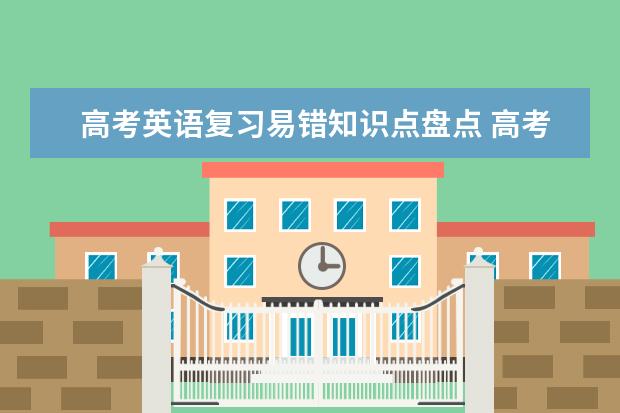今天天天高考网小编整理了高考英语必背知识点梳理 届高考英语仿真模拟试题附答案相关信息,希望在这方面能够更好的帮助到考生及家长。
高考英语必背知识点梳理
关于高考英语必背知识点梳理
高考进行一轮复习当中,考生们应该如何复习高考英语这个考试科目呢?下面小编为大家带来高考英语必背知识点梳理,欢迎大家参考阅读,希望能够帮助到大家!
高考英语必背知识点梳理
1)achieve
表示“完成,到达”。
区别achieve,reach,gain:
achieve着重表示达到一定目的的过程中所需要的技能,耐性和努力。
reach指达到任何目标、目的或指达到发展过程中的某个阶段。
gain强调经过奋斗才达到所期望的目标、优势或者有利地位。
2)condition
表示“条件”,condition为单数时,表示人/物所处的“状态”。
conditions(复数)指一般情况,环境。
in good/poor condition状况好/不好。
out of condition状况不好。
on condition that在……条件下,假使。
on no condition决不。
3)connection
表示“连接,关系”。
connections亲戚。
in connection with与……有关。
4)behave
表示“举止,举动,行为表现”。
behave oneself表现良好,行为良好。
behave as起……作用,表现为……。
5)worthwhile
表示“值得做的,值得出力的”。
句型It is worhtwhile doing/to do sth“干……是值得的”。
6)observe
表示“观察,注意”,可接省略to的不定式的复合结构,当observe用被动语态时,其后的不定式应回复to。
observe后也可接由现在分词构成的复合结构。
后接that从句,表示“注意到,说”。
observe还可以表示“遵守,庆祝”。
7)respect
作动词,后直接跟宾语。
respect oneself自重,自尊。
作名词,表示“尊重,尊敬”。have/show respect for意为“对……尊重/尊敬”。
have respect to注意,考虑。
表示“敬意,问候”时,用复数形式,常与give,send,pay连用。
in respect of sth就某方面而言。
with respect to 涉及,关于。
8)argue
表示“争论,辩论”。
argue with sb(about/for…)(为/关于……)和某人辩论。
argue about就某事而论。
argue for/against…辩论赞成……/反对……。
argue back反驳。
argue sb into/out of doing sth说服某人做/不做某事。
9)inspire
表示“鼓舞,激发”。
inspire sb(to do sth)赋予某人灵感,启迪。
inspire sb(with sth)/inspire sth in sb激励/鼓励某人的……。
形容词inspired表示“有创造力的,有雄心壮志的,受灵感启示的”;形容词inspiring表示“鼓舞人心的,使人感兴趣的”。
10)support
作及物动词,表示“支撑,扶持,养活”。
作可数名词,表示“支撑物,支持的人/物,赡养者,赞助金”。
作不可数名词,表示“支持,养家,赡养”。
come to one’s support来支持某人。
in support后备的,准备给予支援的。
in support of支持,证明。
11)look down on/upon
表示“蔑视,瞧不起”。也可以用look one’s nose at来表示。
有关look的短语:
look for寻找,期待 look forward to doing盼望做某事 look on…as把……看作
look out朝外看,当心,注意,查出 look through浏览,仔细查看,审核
look up查看,抬头看 look after照顾 look back on/to sth 追思,回顾
look in(on sb)顺便访问 look into sth调查 look over sth 检阅,检查
look to注意 look sb up and down上下打量某人
12)explain
作及物动词,表示“解释,说明”,常接名词,代词,从句作宾语,若表示“向某人解释某事”,应说explain sth to sb或explain to sb sth。
explain oneself为自己的行为辩解。
explain后接由连接代词或连接副词引导的不定式或短语作宾语。
13)strike
表示“打,击,敲”。
表示“通过摩擦产生(火花,光亮)。
表示“打动,引起,迷住,*”。
表示“打”时,常套用在“动词+sb+介词+the+表示身体某一部位的名词”句型中。
strike to向……打去。
strike for/against为争取/反对……而*。
srike sb down把某人_,使某人丧命。
strike on sth意为获得/发现某事。
strike home击中要害。
14)consideration
表示“考虑,体谅”。
take sth into consideration考虑某事,体谅某事。
leave sth out of consideration忽略某事,不重视某事。
in consideration of sth作为对……的回报,考虑到。
15)deliver
表示“递送,释放,发表(演说)”。
deliver a baby接生。
deliver on sth不负重望,履行诺言。
16)devote
devote…to献身于……,专心于……。to是介词。
devote oneself to献身于,致力于,专心于。
形容词devoted表示“忠实的,热爱的,全心全意的”。be devoted to sb/sth 表示“对某人/某物忠实(热爱,全心全意)。
高考英语必修知识点
1. especially v. 特别地
2. imagine v. 想像
3. alone adv. / adj. 单独,孤独的
4. interest n. 兴趣
5. everyday adj. 每天的,日常的
6. deserted adj. 抛弃的
7. hunt v. 搜寻
8. share v. 分享
9. care v. 在乎,关心
10. total n. 总数
11. majority n. 大多数
12. survive v. 生存,活下来
13. adventure n. 冒险
14. scared adj. 吓坏的
15. admit v. 承认
16. while conj. 但是,而
17. boring adj. 令人厌烦的
18. except prep. 除……之外
19. quality n. 质量
20. favourite adj. 最喜爱的
高考英语基础知识点
1.take part in 参加
2.used to 过去常常
3.change one's mind 改变主意
4.play an important role in 在...中起重要作用
5.compete against/for 与...比赛
6.work out 计算出
7.make sure 有把握
8.a set of 一组
9.as well as 也;又
10.every four years 每四年
11.one after another 陆续地
12.all over the world 遍及世界
13.as a matter of fact 事实上
14.pick up 拾起
高考英语复习知识点
1.if not 如果不…. If so 如果这样,
2.consider oneself sth 自认为是…consider sb sth 认为某人是…
3.since then 从那时起
4.search for a way to do sth 寻找做某事的途径。
5.thanks to 幸亏,由于,因为(to为介词)
6.rid…of… 摆脱,除去get rid of 除去…
7.be satisfied with 对……感到满意
8.would rather do than do宁愿,宁可…也不…=woulddo rather than do
9.with the hope of 满怀希望..
10.in some way 在某种程度上
11.cause damage to 对… 造成危害。
12.build up 增强,强大
13. lead to 导致,造成(to为介词)
14. focus on 集中(注意力、精力等)于
15. keep…from/of 使……免受(影响、伤害等)
高考英语知识点资料
1.sunburn v.日晒,晒黑→sunburntadj.晒黑的
2.struggle v./n.挣扎,奋斗,努力 struggle against struggle for struggle with
3.decade n.十年,十年期
4.super n.冗员, 额外人员;[口]特级品, 特大号商品; 超级市场adj特级的, 极好的, 非凡的
5. hunger n.饥饿,渴望/v.使饥饿→hungryadj.饥饿的;渴望的
6.output n. 产量,输出,input输入,消费
7.disturbing adj 引起烦恼的,令人不安的,disturb v. 打扰,麻烦
8.expand vt.扩大, 扩展,张开, 使发, 详谈; 引伸
9. circulate v.循环,流通→circulationn.循环,流传
10. battle n.战役,战斗v.搏斗,奋斗
11. therefore adv.因此,所以
12. rid vt 摆脱,除去
13.freedom n 自由,自主→free adj 自由的,免费的
14.equip v.配备,装备→equipmentn.设备
15. export v.输出,出口n.输出(品)→import v.输入,进口n.进口(品)
16.nationality n 国籍,national adj 国家的,民族的nation n. 国家
17.occupation n 工作,职业,占领occupy v.占用,使从事,把注意力集中于...占领, 占据
18.confuse v.使迷惑,使为难→confusedadj.感到迷惑的confusing adj.令人迷惑的
19.regret v./n.后悔,遗憾→regretfuladj.后悔的,遗憾的
20.production n.生产,*,productive可生产的,可*的,produce –v 生产,*
21.discovery n. 发现,发觉,discover-v发现,
22.focus v. 集中,聚焦,n 焦点,中心点
23. reduce v.减少,缩减→reduction n.减少,缩减
24.comment n./v.评论,议论
2017届高考英语仿真模拟试题附答案

2017届高考英语仿真模拟试题附答案
英语是一种重要的交际工具,也是我国高考的重要科目。今天,学习啦小编为大家整理了2017届高考英语仿真模拟试题附答案。
2017届高考英语仿真模拟试题第一卷(共三部分115分)
第一部分 听力题:( 共两节20小题,每小题1.5分,共30分)
第一节:(共5小题,每小题1.5分,满分7.5分)
听下面5段对话,选出最佳选项。
1.How will the woman get home?
A. By car B. By bus C. By bike
2. Where does the conversation take place ?
A. In a concert hall B. In a restaurant C. In a shop
3. What are the speakers talking about?
A. a game B. An earthquake C. A fire
4. What are the speakers doing?
A. Shopping B. Ordering food C. Celebrating a birthday
5. What does the man say about the woman’s paper?
A. The data is out of date
B. The *ysis of the market is accurate.
C. The data interests him a lot.
第二节:( 共15小题,每小题1.5分,满分22.5分)
听下面5段对话或独白,选出最佳选项。
听下面一段材料,回答第6至第8题
6.What does the man think of the multimedia(多媒体) products in the catalogue?
A. unattractive B. Unnoticeable C. Creative
7. What does the man offer to do ?
A. Print a catalogue B. Design a product C. Figure out the cost
8. When will the speakers meet again?
A. Next Monday B. This Friday C. This Tuesday
听下面一段材料,回答第9至第11题
9. Why is the woman calling?
A. To change some desk units B. To ask for immediate delivery C. To place an order
10.How soon does the man’s company usually deliver goods?
A. Within 5 business days B. Within 7 business days C. Within 14 business days
11. What will the man do this afternoon?
A. Give the woman an estimate B. Call the woman back C. Answer an e-mail
听下面一段材料,回答第12至第14题
12. What does the man suggest the woman do at first?
A. Check at Lost Property Office B. Report the loss to the police C. Call the cinema again.
13. When did the woman find she had lost her wallet?
A. When she bought the tickets B. When she got to the dorm C. When she left the cinema
14.What do we know about the woman?
A. She will ask Joyce for help B. She went to the cinema alone C. She is sure where she lost her wallet
听下面一段材料,回答第15至第17题
15. How long is breakfast served?
A. For two hours B. For three hours C. For three and a half hours
16. Where is the exercise room?
A. On the first floor B. On the second floor C. On the third floor
17. Where can the man get free wireless access?
A. In his room B. In the parking lot C. In the hall
听下面一段材料,回答第18至第20题
18. What does the speaker talk about ?
A. Her hobby B. Her daily routine C. Her study
19. Where does the speaker usually read?
A. In a study B. In a coffee shop C. In his living room.
20. Where did the speaker get usual information or recipes?
A. From books B. From magazines C. From newspapers
第二部分:英语知识运用
第一节:单项填空:(共15小题,每小题 1 分,满分15分)
21. My teacher asked me to copy _____ article _____ second time.
A.an; the B.an; a C.the; a D.the; the
22. —You've agreed to go.So aren't you getting ready?
—But I ______ that you would have me start at once.
A.didn't realize B.don't realize C.haven' t realized D.hadn't realized
23. This kind of glasses made by experienced craft*en _________ comfortably.
A. is worn B. wears C. wearing D. are worn
23. Between 1974 and 1997, the number of overseas visitors expanded _________27%.
A. by B. for C. to D. in
24. —You all like your English teacher?
—Yeah, she devotes herself____ to teaching and it earns her a good reputation.
A.originally B.extremely C.obviously D.entirely
25. She remained ______for a while after the movie ended, which made others ________. .
A. sitting; puzzling B sat; puzzled C. seated; puzzled D. seated; puzzling
26. In my opinion,_____ shouldn't be any doubt that China will become one of the most powerful countries in the near future.
A.this B.that C.it D. there
27. Our company is seeking for a manager, especially ¬¬_______with creativity and imagination.
A. the one B. each C. one D. that
28. — _______made Daisy wild with joy?
—Her success in the A-level exam this year.
A. How was it that B. When was it that C. Why was it that D. What was it that
29. They were ahead during the first half of the match, but they _______ in the last five minutes.
A. were beating B. beat C. were beaten D. had been beaten
30. —You’ve been driving for hours. Shall I _______ ?
—No, that’s OK. I enjoy driving and I know you hate it, especially on the highway.
A. take back B. take on C. take over D. take up
31. She ought to stop work; she has a headache because she ___________ too long.
A. has been reading B. had read C. is reading D. read
32. Afghans used to hold big weddings, costing thousands of dollars, in a county _____ the average annual income is less than $400.
A. which B. whose C. where D. what
33. —“Do you mind if I look at your notes?”
—“Of course not. _______.”
A. No problem B. Be my guest C. With pleasure D. Not at all
34. Doing your homework is a sure way to improve your test scores, and this is especially true ____ it comes to classroom tests.
A. before B. since C. when D. after
35.It is hard to say what kind of person he is. Sometimes he is very friendly; at other times he ___ be very cold.
A. can B. must C. will D. shall
第二节:完形填空(共20小题;每小题1.5分,共30分)
阅读下面短文,掌握其大意,从每题所给的A、B、C、D四个选项中,选出最佳选项,并在答题卡该项涂黑。
He met her at a party. She was outstanding; many guys were 36 her, but nobody paid any attention to him. After the party, he 37 her for coffee. She was 38 . In order not to appear rude, she went 39 .
As they sat in a nice 40 shop, he was too nervous to say anything and she felt 41 .
Suddenly, he asked the waiter, “Could you please give me some 42 ? I’d like to put it in my coffee.”
They stared at him. He turned red; but when the salt came, he put it in his coffee and drank. 43 , she asked. “Why salt with coffee?” He explained, “When I was a little boy, I lived near the sea, I liked playing on the sea… I could 44 its salty taste, like salty coffee. Now every time I drink it, I 45 my childhood and my hometown. I miss 46 and my parents, who are still there.”
She was 47 touched. A man who can admit that he’s homesick must love his home and care about his family. He must be 48 .
So they dated, 49 and lived happily together. And every time she made coffee for him, she would put in some salt, the way he liked it.
After 40 years, he 50 and left her a letter which said:
My dear, please 51 my life-long lie. Remember the first time we dated? I was so nervous that I asked for salt 52 sugar.
Sweetheart, I don’t exactly like salty coffee. But as it mattered so 53 to you, I’ve 54
to enjoy it. Having you with me was my greatest happiness. If I could live a second time, I hope we can be together again, 55 it means that I have to drink salty coffee for the rest of my life.
36.A. before B. beyond C. after D. near
37.A. invited B. paid C. forced D. asked
38.A. interested B. frightened C. moved D. surprised
39.A. away B. along C. off D. down
40.A. coffee B. tea C. beer D. wine
41.A. comfortable B. different C. uncomfortable D. indifferent
42.A. sugar B. pepper C. candy D. salt
43.A. Angrily B. Curiously C. Worriedly D. Happily
44.A. feel B. see C. notice D. find
45.A. think over B. bring up C. think of D. remind of
46.A. this B. it C. him D. her
47.A. highly B. specially C. hardly D. deeply
48.A. responsible B. reasonable C. sensible D. representative
49.A. married B. engaged C. separated D. split
50.A. walked away B. left away C. passed away D. got away
51.A. forget B. forgive C. imagine D. value
52.A. instead B. instead of C. in spite of D. other than
53.A. many B. more C. any D. much
54.A. studied B. learnt C. adapted D. used
55.A. however B. as it C. when D. even if
第三节:阅读理解(共20小题,每题2分,满分40分)
( A )
For a writer, there is hardly any greater honor than winning the Nobel Prize for literature.
And for a woman writer, claiming the prize is even harder, for only eight women once won it. Austria’s Elfriede Jelinek is the ninth and the first since 1996.
The Stockholm-based Swedish Academy announced last Thursday that Jelinek won this year’s Nobel Prize in literature. She is recognized for her socially critical(批判的) novels and plays.
Jelinek, 57, made her literary debut (初次露面) in 1967. She has written plays, novels and poetry. She is best known for her autobiographical 1983 novel “The Piano Teacher”, made into a movie in 2001.
The basic theme of her work is the inability of women to live as people beyond the roles and personalities traditionally expected of them. Her characters struggle to lead lives not normally acceptable in society. “The nature of Jelinek’s texts is often hard to define. They shift between prose(散文) and poetry and songs, they contain theatrical scenes and film script,” said the academy.
The Nobel Prize was founded by Swedish inventor Alfred Nobel. Nobel died in 1896 and left his fortune of about US $920 million to a fund to honor people who have helped other human beings. This year each prize is worth US $13 million.
56. The underlined word “them” in the last second paragraph refers to _______.
A. roles B. people C. texts D. women
57. Elfrede Jelinek won the Nobel Prize just because _______.
A. she was an Austrian woman writer
B. she wrote socially critical novels and plays
C. her novel “The Piano Teacher” was made into a movie
D. the nature of her texts is hard to define.
58. Which of the following about the Nobel Prize is TRUE?
A. It is harder for a woman writer to win than a man writer.
B. The total prize every year was $920 million.
C. Women writers were not awarded until 1996.
D. Only eight women writers won the prize since 1996.
59. This passage is most likely taken from _______.
A. a travel magazine B. a history book C. a newspaper D. an advertisement
( B )
In many cultures white is often associated with something positive.A white-collar job, for instance, is the kind of job many people look for, working with your brain and not your hands.
White has a clean and pure image.That is why doctors, dentists, and nurses usually wear white uniforms.Babies are dressed in white at bapti*s(洗礼)and brides wear white wedding gowns at weddings.White in these cases is the symbol of innocence or purity.
Sometimes white is used in expressions that are not good.“Whitewash” is one such expression.At first, “whitewash” meant to paint over something with white paint to make it look better.However, it means something different today: to hide or to cover up mistakes or failures.
A “white elephant” is another example of white used in a negative way.In ancient Thailand, a white elephant was regarded as a sacred animal, but it was very expensive to keep.The kings of those days presented a white elephant to the people they wanted to ruin.Once they received this holy, royal animal as a gift, they were not allowed to sell or kill it.Today, a “white elephant” means something that is big, useless, and unwanted.In America, when people want to get rid of their furniture or clothes, they often have a “white elephant sale”.
60.The text is mainly about________.
A.the meanings of white in English culture B.the history of some English idioms
C.some interesting customs in English culture D.some useful English words and expressions
61.Which expression has an historical background ?
A.White-wash. B.White-collar.
C.White elephant. D.White elephant sale.
62.In which statement does “white” have a negative meaning?
A.A boy is dressed in white at bapti*s. B.A bride wears a white wedding gown.
C.A man whitewashes his crime. D.A girl finds a white collar job.
63.The author develops the text mainly by ______.
A.*yzing its cause and effect B.providing typical examples
C.comparing different ideas D.following the time order
( C )
Students who say they never or hardly ever used dictionaries often speak English well but usually write poorly, because they make many mistakes.
The students who use dictionaries most do not learn especially well either. The ones who look up every new word do not read fast. Therefore they do not have time to read much. Those who use *all two-language dictionaries have the worst problems. Their dictionaries often give only one or two words as translations of English. But one English word often has many translations in a foreign language and one foreign word has many translations in English.
The most successful students are those who use large college edition dictionaries with about 100,000 words but do not use them too often. When they are reading, these students first try to get the general idea and understand new words from the context. Then they reread and use the dictionary to look up only key words that they still do not understand. They use dictionaries more for writing. If they are not sure how to spell a word, or divide it into syllables(音节), they always use a dictionary. Also, if they think a noun might have an unusual plural form, they check these in a dictionary.
64.The writer thinks that .
A. choose a good dictionary, and you’ll be successful in learning English
B. dictionaries are not necessary to the students who learn English.
C. it is very important for students to use good dictionaries properly
D. using dictionaries very often can’t help to improve writing
65.According to the passage, which of the following is wrong?
A. Dictionaries have little effect on learning to speak English.
B. Whatever new words you meet while reading, never use dictionaries.
C. Small two-language dictionaries have serious disadvantages.
D. Reading something for the first time, you’d better not use dictionaries.
66.This passage mainly tells us . .
A. that students shouldn’t use *all two-language dictionaries
B. what were the defects of *all two-language dictionaries
C. why students should use large college edition dictionaries
D. what dictionary students should choose and how to use it
67.Which is not mentioned in this passage?
A. How to make good use of a dictionary. B. When to use a dictionary.
C. How to improve spoken English. D. How to practise reading fast.
( D)
The pupils of the remote Beau-Roc primary school in Haiti are chanting (singing the same words again and again).One of them plays a guitar made from an empty oil tin.Their headmistress, Emile Jean-Noel, is one of the few women school headteachers in the country.
Today, over 70% of Haitian population live without proper food, water, schools, or housing. To reduce the hunger that prevents learning and to encourage parents to send their children to school, meals are provided by the World Food Programme.
"We are so cut off that we have many difficulties," comments Emile, adding that finding chalk, school books and other materials is practically impossible.Emile tries to encourage people around her to make use of available resources.Her efforts are bearing fruit.One of her successes was convincing local women to contribute to their children' s schooling and increase their income by selling embroidery( 刺绣) and other handicrafts.
Recent political instability(不稳定)has meant that the country has not invested (投资) in education for ten years.Only 44% of children go to school and less than half of them finish primary school. Less than a third of these children go on to secondary school.In rural areas it is not rare to find 17 and 18 year olds in primary school- Beau-Roc has only 4 teachers for 260 pupils.Emile works constantly to improve her pupils' environment.Under her direction, a local worker is now constructing a store house for the food delivered regularly by the WFP.
Not only is Emile' s salary *all, but she receives it irregularly.For her, transport is a real headache.She lives five kilometers away and has to take the tap tap, a privately-owned bus, costing more than she can afford.
"The decision to be a rural teacher in Haiti should not be taken lightly" , Emile comments. "With all the sacrifices and risks it requires, only those who are really cut out for teaching should do it." However, Emile loves her job."I always feel at home with the children and, because the parents understand what I'm doing, I try to give my best."
68.Which of the following is extremely difficult for Beau-Roc primary school?
A.Teaching the women how to make embroidery and other handicrafts.
B.Persuading local women to care about their children' s education.
C.Encouraging people around to use those available resources.
D.Finding chalk, school books and other materials.
69.In the last paragraph, "those who are really cut out for teaching" refer to people who are _____.
A.di*issed from teaching B.unfamiliar with teaching
C.qualified for teaching D.cautious about teaching
70.What topic is presented in this passage?
A.Hardship for teachers. B.Devotion to education.
C.Politics and children. D.Love and beauty.
( E )
51 .She described all the things she had to do -one was to make her bed-from the moment she woke up until she flew out of the door for work.I suggested she experiment by not making her bed for two weeks.She was shocked, probably thinking I’d been raised by wolves in a forest. 52 .
Two weeks later she went into my office beaming.She had left her bed unmade for the first time in 42 years-and nothing bad had happened.“And you know what?” she said.“I don’t dry my dishes anymore, either.”
53 .One was discovering that she had choices in her life that she had never seen before.The other was giving herself permission to be less that perfect.This story shows an important principle (原理) about managing time: No one can do it all.Each of us has to make choices and accept trade – offs.The problem is, many people choose in ways that put themselves and their health last.They take better care of their houses and cars than they do of themselves. 54 .
So what is the solution? There’s an easy way.Decide what you want in your life, and put that first.On a daily basis, that should include regular meals, enough sleep and time with your family.Exercise, leisure, friendships and hobbies should also be regular aspects of life. 55 .The choice is yours: whatever makes you feel good about yourself and your life.Take a nap(小憩).Take a walk.Take time to play the piano.Stop bringing your briefcase home from the office.Stop keeping your house as clean as your mother kept hers.Fill more of your time with want – to – dos instead of have – to – dos.
A.This woman had made two major breakthroughs (突破).
B.Above all, you needn’t do anything for yourself regularly.
C.They put everyone else’s needs ahead of their own.
D.However, she went along with my idea.
E.Most people do not take time to relax themselves.
F.The point is to do something for yourself every day.
G.A patient came to see me about the stress in her life.
2017届高考英语仿真模拟试题第二卷(共35分)
第四部分:写作(共两节,满分35分)
第一节 短文改错(共10小题。每小题1分,计10分)
短文*有10处错误,每句中最多有两处。错误涉及一个单词的增加﹑删除或修改。
增加:在缺词处加一个漏词符号(∧),并在此符号下面写出该加的词。
删除:把多余的词用(﹨)划掉。
修改:在错的词下面划一横线,并在该词的下面写出修改后的词。
注意:1. 每处错误及其修改均仅限一词;
2.只允许修改10处,多者(从第11处起)不计。
I still remember how nervously I was on my first day in the new school two years ago, when I found difficult to follow my teacher in the first English class. The teacher spoke English throughout the class, that was totally different from lessons I had taken before.
In the morning class the next day, the English teacher came to me while I am reading the text aloud .After listen to me for a while, she gave me a big *ile and said he liked my voice very much.The *ile shone on the whole day and the following days.A week later, I was volunteered to take charge of English study in my class.Thank to the comforting *ile in my first morning class, I began to confident.
第二节 书面表达(满分25分)
假设你是李华,你班来自美国的交流生Arthur患病住院已有三周, 请你用英文给他写封信,主要内容包括:
* 询问病情,表示关切 * 介绍班级近期活动,学习等情况 * 表达祝愿
注意:1.词数100左右,2)可以适当增加细节,已使行文连贯 3)信的格式已给出,不计入总词数
Dear Arthur
2017届高考英语仿真模拟试题答案
1—20: (1.5x20=30) ABCCA BCACC ABBAC BBAAC
21—35:(1x15-15) CABAD DCDCC ACBCA
35---55:(1.5x20=30) CADBA CDBAC BDAAC BBDBD
56—75:(2x20=40) DBAC ACCB CBDC DCB GDACF
76—85:1x10=10
76.nervously—nervous 77.found—found it 78.that—which 79.lessons—the lessons 80.am—was 81.listen—listening 82.he liked—she liked 83.was volunteered—volunteered 84.Thank –Thanks 85.confident—be /become confident
Dear Arthur,
It has been three weeks since you went to hospital. How are you feeling now? Hope you will recover soon because all of our clas*ates miss you very much.
As you may know, we have just finished our mid-term exam. I am very happy to say that I made great progress this time. I really appreciate your encouragement. Besides, our school’s sports meeting will be held next Friday and Saturday. Our class did really well last year and I believe we would get more prizes this year if you were to join us.
We are looking forward to your coming back.
Best wishes,
Yours,
Li Hua
猜你感兴趣:
1.2017届高考英语仿真模拟试题及答案
2.2017年高考英语模拟题附答案
3.2017高考英语模拟试题及答案
4.2017高考英语模拟题附答案
5.2017届高考英语模拟试卷
6.2017届高考模拟考试英语卷
以上,就是天天高考网小编给大家带来的高考英语必背知识点梳理 届高考英语仿真模拟试题附答案全部内容,希望对大家有所帮助!
如果你需要图片压缩,天天高考小编推荐个不错的在线图片压缩网站:https://www.yasuotu.com/
本文标题:高考英语必背知识点梳理 届高考英语仿真模拟试题附答案
wap地址: https://m.ttjm.com/zixun/616337.html









